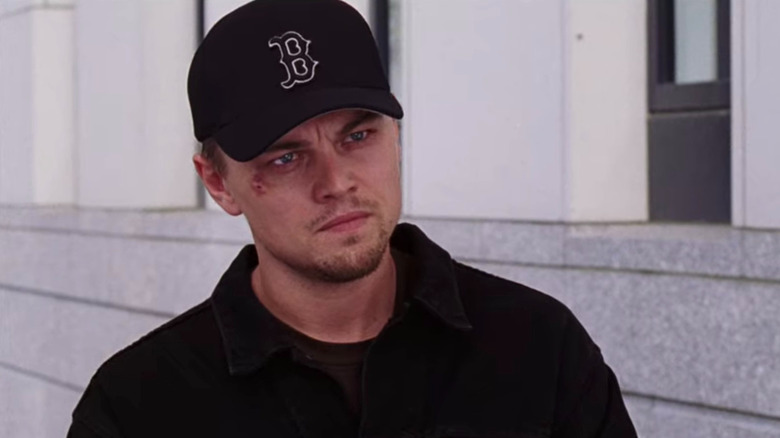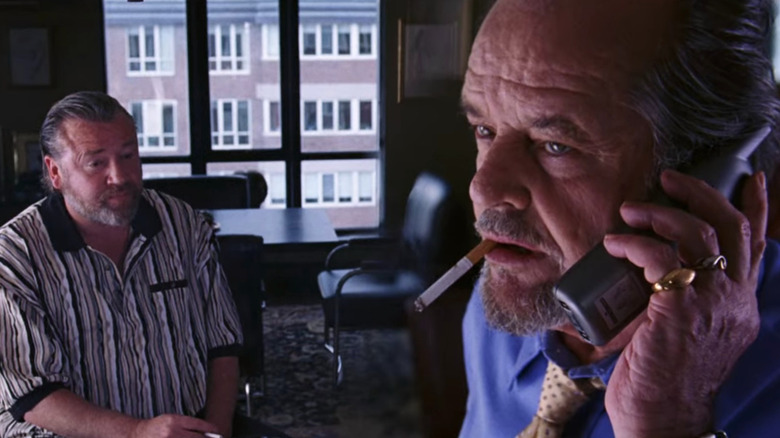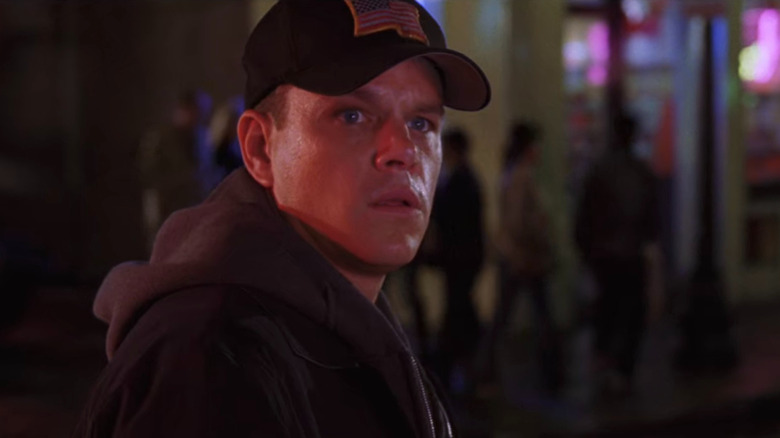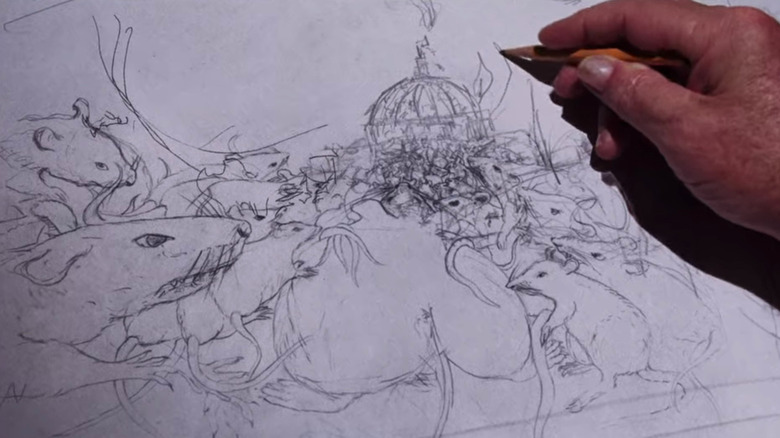The Daily Stream: The Departed Is A Rare Remake That Matches The Original With Fresh Themes
(Welcome to The Daily Stream, an ongoing series in which the /Film team shares what they've been watching, why it's worth checking out, and where you can stream it.)
The Movie: "The Departed"
Where You Can Stream It: Netflix, HBO Max
The Pitch: A cop and criminal each risk blowing their cover while acting as informants for the other side of the law in Martin Scorsese's Boston-set "Infernal Affairs" remake.
"The Departed" is a movie where (more than two) characters lead double lives, and double-featuring it with "Infernal Affairs," the Hong Kong film on which it's based, is an experience that gets the viewer to look beyond the surface-level plot similarities and really focus on what it is that makes this movie tick in terms of subtext. The cultural specificity of "shipping off to Boston" instead of Hong Kong is just one layer of contrast. Scorsese puts a Catholic slant on a narrative that originally began with a quote from the Nirvana Sutra and glimpses of golden statues at a Buddhist temple.
Substitute "sinner" for "criminal," and the tightly wound Billy Costigan (Leonardo DiCaprio) might not be so different from the priest in "Silence" who openly betrays his religion, all the while telling himself he remains true to it in his heart. The yin to his yang is Colin Sullivan (Matt Damon), the corrupt saint with a badge who seems happier and more well-adjusted until his misdeeds start to catch up with him.
"The Departed" explores duality and duplicity and even its camera language reflects this, with split diopter shots keeping foreground and background figures in focus with a blurry line down the middle. When viewed through a lens of comparison with "Infernal Affairs," it's a distinctly American movie that reckons with doomed ambition and the pretenses of two-faced mortals.
Why it's essential viewing
Despite its violence, "The Departed" is the film that finally won Scorsese an Oscar for Best Director, but that distinction often gets written off as a lifetime achievement award to compensate for all the other classics where he was overlooked, such as "Goodfellas," "Raging Bull," and "Taxi Driver." It doesn't necessarily inhabit the same top tier in his filmography as those titles, but it also won Best Picture and features a killer ensemble.
The real reason it's worth a watch — more likely, a rewatch — is that "The Departed" offers a good case study in how a remake, when done right, can re-contextualize the same story with different themes. The movie begins with footage of civil strife in America's streets as Frank Costello (Jack Nicholson) says in voiceover, "I don't wanna be a product of my environment. I want my environment to be a product of me." That's a much different sentiment than "Infernal Affairs," which opens with the quote, "The worst of the Eight Hells is called Continuous Hell. It has the meaning of Continuous Suffering."
At one point, the openly racist Costello is framed as Lucifer in red; he's even got the goatee for it. Echoing the devil by way of James Joyce, he teaches boys in his Irish neighborhood the phrase non serviam ("I will not serve") and goes around antagonizing nuns and pederast priests. That mid-2000s "environment" of his is one where flip phones are fetishized and homophobic slurs flow uncensored from the lips of tough-talking Bostonians.
Another significant change "The Departed" makes is to combine two separate characters into Vera Farmiga's police psychiatrist, Dr. Madolyn Madden, who talks about lying "to keep things on an even keel" as she gets involved with both Sullivan and his similarly dressed alley shadow, Costigan.
'I gotta find myself'
Sergeant Dignam (Mark Wahlberg) observes that putting up a front is something most people do every day, while Captain Queenan (Martin Sheen) insists that they "deal in deception," not self-deception. For Sullivan, however, self-deception — the ability to live in contradiction with his outward image — is the key to advancement.
Throughout "The Departed," there's talk of working hard, rising fast, and wanting a clean slate. These impulses aren't limited to the U.S. but they are characteristic of the American dream, which doesn't come true for everyone. Early on, Costigan is faced with the reality that his path is set and the question of whether he wants to be a true cop, or just appear to be one, like Sullivan. Since he can't escape his past or family history (his father was a janitor and his uncle was a crook), he's going to have to get down in the muck with mobsters if he wants to make a difference.
Costigan later comes to the realization that being an undercover cop, in and of itself, isn't an identity. In fact, it's something that can be all too easily erased with a single keystroke and the deletion of his police personnel profile.
He and Sullivan cancel each other out. Though he appears self-assured and his confidence attracts Madolyn, Sullivan also struggles with who he is. Tasked with finding the mole in his unit, he looks out from under a hat with the American flag on it and jokes, "I gotta find myself." An iris shot shows the wide-open world of possibility that awaits him in the state capitol. Later, another iris shot shows how tightened and narrow his world has become as he settles into his dark office, a pariah to both colleagues and dog-walking neighbors in his apartment building.
'A nation of f****** rats'
By exposing Sullivan, Costigan seeks to kill the side of himself that dwelled as an imposter among police cadets back at the academy. Likewise, by rooting out Costigan, Sullivan seeks to kill the side of himself that dwelled as an imposter among criminals back in his old neighborhood. Sullivan wants to be good; he enjoys the trappings of that life, with its view of the State House, the status of heading up an investigation, and the hero's welcome he receives from his fellow troopers.
Though it happens offscreen, we learn that Sullivan can't perform in bed with Madolyn after delivering information to Costello, as if he suffers from guilt. Yet he soon discovers that Costello himself is an FBI informant, as much a hypocrite as anyone else. Maybe that's why, in his sketches, Costello envisions overgrown rats swarming the Capitol. His top lieutenant, Frenchie (Ray Winstone), proclaims that they live in "a nation of f****** rats." The movie's final image simply puts a cheeky bow on the whole affair.
Where "The Departed" greatly differs from "Infernal Affairs" is in its ending. In Scorsese's film, Dignam, the character who's unimpressed with everyone, restores balance at the end. "Infernal Affairs" is more willing to upset the equilibrium and let one of its dual protagonists enjoy a pyrrhic victory, admiring his fallen counterpart as he faces the hardship of longevity.
The meaning of the title change is hinted at in dialogue, as Costello notes how "we all are" on our way out — we're all the faithful departed — and should "act accordingly." The viewer, blind to their own mortality and hypocrisy, might identify with a cop or criminal or sinner or saint, but as "The Departed" puts it, "When you're facing a loaded gun [i.e. death], what's the difference?"



